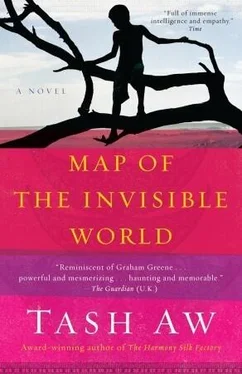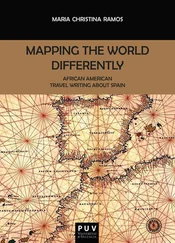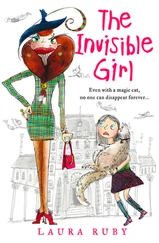Tash Aw - Map of the Invisible World
Здесь есть возможность читать онлайн «Tash Aw - Map of the Invisible World» — ознакомительный отрывок электронной книги совершенно бесплатно, а после прочтения отрывка купить полную версию. В некоторых случаях можно слушать аудио, скачать через торрент в формате fb2 и присутствует краткое содержание. Год выпуска: 2010, Издательство: Spiegel & Grau, Жанр: Современная проза, на английском языке. Описание произведения, (предисловие) а так же отзывы посетителей доступны на портале библиотеки ЛибКат.
- Название:Map of the Invisible World
- Автор:
- Издательство:Spiegel & Grau
- Жанр:
- Год:2010
- ISBN:нет данных
- Рейтинг книги:4 / 5. Голосов: 1
-
Избранное:Добавить в избранное
- Отзывы:
-
Ваша оценка:
- 80
- 1
- 2
- 3
- 4
- 5
Map of the Invisible World: краткое содержание, описание и аннотация
Предлагаем к чтению аннотацию, описание, краткое содержание или предисловие (зависит от того, что написал сам автор книги «Map of the Invisible World»). Если вы не нашли необходимую информацию о книге — напишите в комментариях, мы постараемся отыскать её.
comes an enthralling novel that evokes an exotic yet turbulent place and time—1960s Indonesia during President Sukarno’s drive to purge the country of its colonial past. A page-turning story,
follows the journeys of two brothers and an American woman who are indelibly marked by the past — and swept up in the tides of history.
Map of the Invisible World — читать онлайн ознакомительный отрывок
Ниже представлен текст книги, разбитый по страницам. Система сохранения места последней прочитанной страницы, позволяет с удобством читать онлайн бесплатно книгу «Map of the Invisible World», без необходимости каждый раз заново искать на чём Вы остановились. Поставьте закладку, и сможете в любой момент перейти на страницу, на которой закончили чтение.
Интервал:
Закладка:
“This,” he began softly, still staring at the slide, “I do not think I have seen this before.” He cleared his throat again. “I cannot remember.” He blinked at the slide — once, twice. A thin frown crept over his brow and his eyes appeared glassy, as if suddenly troubled by a speck of dust.
Margaret wanted to fill the silence but she could not find the right words, either in Indonesian or in English. She looked again at the photograph of the two presidents. A slight wind made Kennedy’s hair wispy and his eyes squint; Margaret could not see Sukarno’s eyes, for they were hidden behind his very modern sunglasses, which matched the perfect blackness of his topi . They looked like a schoolboy and his fashionable-but-stern uncle on an outing, each trying to appear happy, even though they had little to say to each other. It was the kind of cheerfulness put on when nothing one said would make sense to the other person, and to avoid the awkwardness of a ruined afternoon together, both parties make every effort to be happy, yet this pretense of great happiness leaves them feeling empty and lost, for each thinks: I should know what it is like to be this happy, but I do not.
The president blinked at the image a few more times and then lowered it, sliding it neatly back into the envelope. He said, “I think the time for gifts has passed.” Margaret began to reply but he continued to speak. “There was a time when this — how shall we say? — this relationship between us, between our two countries, might have worked. We might even have loved each other. For a time, maybe we even thought we did. We gave each other many gifts. We were both much younger then, and much more foolish. And now, I am afraid that time has passed.”
“Perhaps,” Margaret began; she breathed deeply, trying to sound calm, “perhaps it was not foolishness but hopefulness.”
The president looked at her, his expression changing minutely, becoming less benign, Margaret thought, the edge of his mouth lifting as if to mock her. But when he spoke his voice was very calm. “Hope. Americans always talk of hope. What you hope for now is that I will do something for you,” he said at last. “Is this correct?”
Margaret did not answer.
“When Western people offer gifts they expect something in return. When Asian people receive gifts, on the other hand, they think immediately of how to return this kindness. So in fact, the two work very well — though not always fairly. This is why I cannot accept your gift, for I have nothing to give your country in return. Now I must get back to my work as leader of this country. It was pleasant to meet you.” He pushed the envelope to the edge of the table and the young aide-de-camp retrieved it swiftly, handing it back to Margaret as he put his hand lightly on her elbow to lead her out of the room.
“Please,” Margaret said, turning back to the president, “you do not want to give anything to my country, I understand that. But would you give me something — the gift of kindness? I have nothing to offer you, I can only ask — plead — for your help.”
The president raised his eyebrows.
“I am asking for your help, as one humble human being to another.”
He nodded. “Go on.”
“There is someone I need to find. He is lost in this city. Maybe he is with the army, maybe not. No one seems to know. He is Dutch by birth but Indonesian by nationality, and now I am afraid he has been taken away.”
“Ah, een Nederlander,” the president said, laughing his slow, rich laugh. He had taken a cigarette from a silver box sitting on the table. “I understand from your voice that this is someone you love.”
Margaret felt light-headed and very hot. She nodded. “Some might say that.”
He studied her for some time, and then he looked at his colleagues; the cigarette was very slim between his thick fingers. He shook his head and smiled. “As I said, the time for gifts has passed.”
27
I n an earlier time, in a place far from this city, gifts had seemed plentiful in Margaret’s life. This period had not lasted very long — a year, perhaps — but it seemed to fill the entire canvas of Margaret’s adolescence so that whenever she thought of her childhood now, all she could remember was that there had been so much to give and receive. Maybe this was what happened as one grew older: The tiny incidents of youth acquired a magnitude they did not really possess. “Never, ever trust your memory,” her mother used to tell her, “it never gives you what you want. When you go back to it, hoping for solace, all you get is misery. And when you need to use it as a library, purely for information, it’s always blank. Just leave it all behind and concentrate on the present.”
This was what Margaret tried to tell herself over the years, whenever her forays into her memory provided her with nothing but an emptiness in her chest, as if her heart had stopped beating for about five or six seconds. But the problem was that she knew her memories were all true, every last detail. She remembered how this period of gifts and gift-giving had ended, the very moment her life passed from the clarity of childhood into the murky depths of adulthood. Her memory of it had never warped, never blurred; it always retained the sharp edge of truth.
“I’m leaving,” Karl said. It was one of those nights when the Balinese moon was so full and clear and the air so still and warm that there did not seem to be any need for day; one of those dry evenings that come in the middle of the rains and make you forget the days of mist and mud. They stood in the yard at the center of Karl’s compound, surrounded by the silvery outlines of the houses.
“I know. I heard about what happened.” Margaret could see his face clearly — more clearly, she thought, than if it had been day. When he blinked she could see the bright moistness of his eyes. He did not answer. “Lots of people are leaving,” she continued, filling in the silence. “It hasn’t been the same these last few months with all the news we’ve been getting.”
Six months ago, Margaret had never heard of Sudetenland, or of Moravia or Silesia. She knew about the independent state of Czechoslovakia, but she thought that Bohemia was a place inhabited by penniless writers and artists, or people such as her mother, who was often called “Bohemian.” For a while she had believed that to be Bohemian was to have no fixed home, so she herself might have been Bohemian. Now she knew all too well where these places were.
“There’s going to be a war, isn’t there?” Margaret said.
Karl nodded. “We can’t pretend anymore, we have to accept it. Ever since Anschluss I’ve feared this day would come. Everyone was saying, Oh, but no, the Germans didn’t invade Austria, they didn’t fire a single shot. But we knew, we knew . And now this.” For a moment he sounded almost angry and Margaret realized she had never known him to be angry. She reached out for his hand and tried to picture these invaded countries, their hills covered with pine forests tinged with patches of melting snow, the tanks rolling slowly through the river valleys while small children watched fearfully from the windows of their mountain houses, muttering silent prayers. She wanted to share in the distress and helplessness that he was feeling, but she could not. All this was happening so far away, in places remote and beautiful, places that had nothing to do with her. You could only feel pity for somewhere if you belonged there, she thought. Karl belonged to Europe, but she did not.
“Sorry,” he said, “I have to sit down.”
“Sure, oh god, of course.” They crossed over to a bench at the edge of the yard. “How is your leg?”
Читать дальшеИнтервал:
Закладка:
Похожие книги на «Map of the Invisible World»
Представляем Вашему вниманию похожие книги на «Map of the Invisible World» списком для выбора. Мы отобрали схожую по названию и смыслу литературу в надежде предоставить читателям больше вариантов отыскать новые, интересные, ещё непрочитанные произведения.
Обсуждение, отзывы о книге «Map of the Invisible World» и просто собственные мнения читателей. Оставьте ваши комментарии, напишите, что Вы думаете о произведении, его смысле или главных героях. Укажите что конкретно понравилось, а что нет, и почему Вы так считаете.












